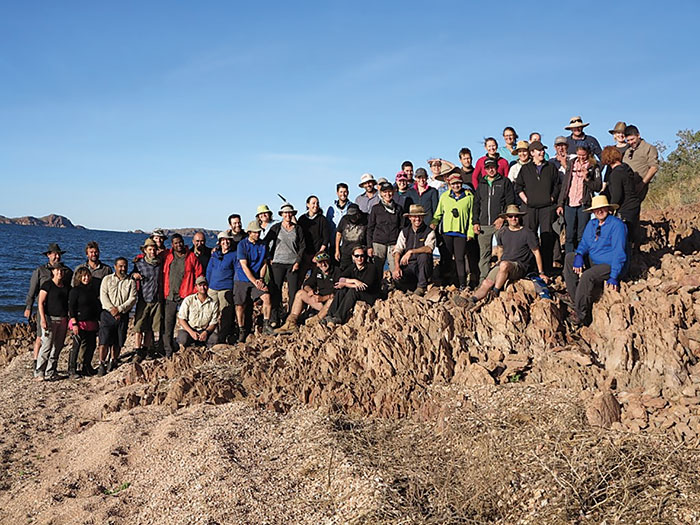Leadership program proves valuable to sector into the future
 Below Helen Jenkins and Alex Ogg with their ARLP group, at the beginning of the program in Western Australia’s Kimberley region.
Below Helen Jenkins and Alex Ogg with their ARLP group, at the beginning of the program in Western Australia’s Kimberley region. Photo: Alex Ogg
By Gio Braidotti
Queensland’s Helen Jenkins was in the midst of her 15-month Australian Rural Leadership Program (ARLP) when, in a “baptism of fire” she found herself testing her newly learned skills.
“The course included media training for crisis management and a week later I was managing a crisis,” she says.
That crisis was the outbreak of white spot disease in the Queensland prawn farming industry while she was executive officer of the Australian Prawn Farmers Association (APFA).
In dealing with the event, Helen Jenkins says her learning from the course provided an inner strength that helped her to manage this difficult period in the industry. “I received a lot of help and support from the people in my cohort.”
Being able to deal with situations out of her comfort zone was one of the skills she took from the ARLP, which she says also created opportunities for collaborative learning, built her courage, and enabled her to take on new and challenging roles.
During 2017 she moved on from the APFA to become aquatic biosecurity liaison officer for northern Australia at Animal Health Australia. “I’ve taken on a bigger area, looking after more industries. I feel that I am better prepared to accept bigger challenges,” she says.
Helen Jenkins is one of two FRDC-sponsored participants in the ARLP’s most recently graduated cohort. The other is Alex Ogg, operations manager for the Western Australian Fishing Industry Council.
The ARLP is a highly regarded program established specifically to meet the needs of people in leadership roles in rural, regional and remote Australia, who often have a unique set of challenges, opportunities and aspirations.
The course stretches over 15 months and includes 55 days of travel. Unlike other programs, the ARLP does not teach a pre-set doctrine. Instead, it provides a broad range of experiences and novel opportunities to acquire new skills.
As Alex Ogg explains, one of the most beneficial experiences for him was the opportunity to deconstruct pre-existing ideas about leadership through a process that enhanced his capacity to listen and for self-reflection and critical thinking. These skills have engendered in him a greater awareness of different perspectives among his stakeholders and the way these inform how people form and communicate their views.
“I experienced significant changes to my mindset over the course of the program,” Alex Ogg says. “I find I’m now listening to people on a deeper level, and seeking a better understanding of the perspective, values and context that lie beneath their stated position. Listening only at the surface level often leads to inappropriate judgement and is often counterproductive in finding solutions to difficult problems.”
Both participants recommend the program to people willing to take their leadership skills to a new level and benefit from a network of more than 1000 alumni. Each intake accepts 30 people via a competitive application process. Scholarships of $55,000 are provided, with participants contributing $5500 to the cost.
The value of grassroots knowledge
Nathan Adams, the vice-chair of the WA Fishing Industry Council and a member of the Abalone Council Australia, is a participant of the 2017-18 ARLP. Already he describes the program as a “life-changing experience”. One of the highlights was the two weeks he spent in the “awesome outback” of WA’s Kimberley region.
“We got challenged mentally, physically and emotionally alongside people from many different backgrounds,” Nathan Adams says. “You learn the importance of a really strong team, building trust and communication. And we got to see that amazing country and participate in cultural learnings.”
Best of all, Nathan Adams says, the program is allowing him to fully capture knowledge he acquired working in the fishing industry and continues to apply working in the WA abalone fishery.
“The program is giving me tools to better tap that grassroots knowledge, adding a better understanding of governance structures and how to get that deep-seated industry knowledge represented effectively.”
For more information about the program see the ARLP website.
FRDC Research Code: 2016-408
More information
Helen Jenkins, hjenkins@animalhealthaustralia.com.au
Alex Ogg, om@wafic.org.au
Nathan Adams, ntadams24@hotmail.com





